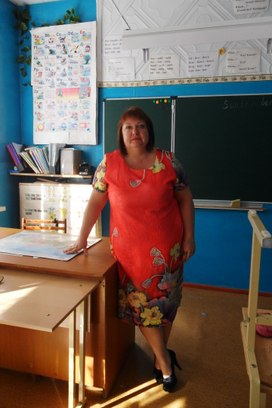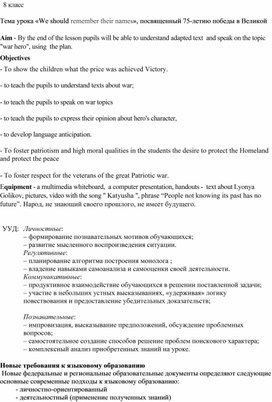8 класс
Тема урока «We should remember their names», посвященный 75-летию победы в Великой
Aim - By the end of the lesson pupils will be able to understand adapted text and speak on the topic "war hero", using the plan.
Objectives
- To show the children what the price was achieved Victory.
- to teach the pupils to understand texts about war;
- to teach the pupils to speak on war topics
- to teach the pupils to express their opinion about hero's character,
- to develop language anticipation.
- To foster patriotism and high moral qualities in the students the desire to protect the Homeland and protect the peace
- To foster respect for the veterans of the great Patriotic war.
Equipment - a multimedia whiteboard, a computer presentation, handouts - text about Lyonya Golikov, pictures, video with the song " Katyusha ", phrase “People not knowing its past has no future”. Народ, не знающий своего прошлого, не имеет будущего.
|
УУД: |
Личностные: |
Новые требования к языковому образованию
Новые федеральные и региональные образовательные документы определяют следующие основные современные подходы к языковому образованию:
- личностно-ориентированный
- деятельностный (применение полученных знаний)
- компетентностный (формирование языковой компетенции в единстве ее составляющих: речевой, языковой, социокультурной, компенсаторной и учебно-познавательной)
- коммуникативно-когнитивный.
Тип урока: устный журнал
Межпредметные связи: история
Основные педагогические методики, применяемые на уроке:
1. Визуализация учебного материала и наглядность
- материал урока построен по форме устного журнала и подается в форме PowerPoint-презентации, что повышает интерес учащихся;
- традиционные наглядные носители картинки используются для оптимизации учебного процесса, переключения внимания и развития зрительной памяти.
2. Деятельностный подход, интерактивность
- предложение догадаться о теме урока развивает умение делать выводы.
3. Индивидуализация
- предлагаются различные опоры для развития монологической речи
4. Речевая направленность: развитие монологической и диалогической речи
5. Ситуативность и функциональность: реальные ситуации (учитель – дежурный, подведение итогов), развитие умения строить монологическую речь по опорам, умение выражать личное и общее мнение.
Формы работы: фронтальная, парная, групповая.
Организация
урока
|
Этап урока |
Деятельность учителя |
Действия учеников |
Формы работы, дополнительные материалы |
||||||||||||||||||
|
1) Организационный момент. |
|||||||||||||||||||||
|
Greeting (2 мин) |
Good-morning to everybody. Nice to see you and our guests. |
Good morning. We’re glad to see you. |
Презентация к уроку выводится на экран. |
||||||||||||||||||
|
2 min Warming-up Song associations (the song " Katyusha ") Answering questions |
"Listen the song" Katyusha " and say what you think about when you hear it." |
Pupils listen the song " Katyusha " P1: when i hear this song i think about village girl P2: when i hear this song i think about love during the Great Patriotic War." P3: i think is about the 75th anniversary of the Victory at the next year |
Видео ролик песни«Катюша» (1 куплет) Слайд 1 |
||||||||||||||||||
|
Introduction of the lesson's theme and plan Aim: To prepare the pupils for emotional perception of the material. |
Teacher: The Second World War was the largest military conflict in history. without doubt, Russia and the whole of the Soviet Union paid the highest price for the victory. T: So, I’ll try to present the topic of our lesson. "Today we are going to read and speak about the young hero of the Great Patriotic War. Also, we‘ll practice new vocabulary and some material.." |
Pupils listen to the teacher attentively. P1: I think we’ll learn some new interesting facts about war. |
T - CL |
||||||||||||||||||
|
Слайд № 1 презентации |
|||||||||||||||||||||
|
Associations with the word ‘World War II’. |
I have many associations with the word World War II. For example: - veterans - morning on June 22nd, 1941; - the hospitals, ; - When you hear the words World War II, which associations do you have? |
P1: The 9th of May 1945 ,solders. P2: the enemy. P3:A great salute , P4: blood |
P1-P2- P3
|
||||||||||||||||||
|
Brainstorming. |
1. when did The Great Patriotic War start? 2. What was the Great Patriotic War for our country? 3. What anniversary of Victory Day do we celebrate this year?
The year 2020 is an important event in a social life of our country. It’s the 75th anniversary of the Victory in the World War II. Years passed but some soldiers continued fighting with their wounds and horrible memories. We must always be grateful to our grandmothers and grandfathers, who could survive and are still living in these days |
P1: The Great patriotic war began in 1941 and finished in 1945. P2: The cruelest war/million of people died/time of our great victory/defeat of Nazis. P3: the 75th anniversary |
T - P1-P2- P3 |
||||||||||||||||||
|
2. Основная часть |
|||||||||||||||||||||
|
Reading |
|||||||||||||||||||||
|
pre-reading |
Divide into three groups and find out it there are any the facts |
(отмечают в тексте знаками +, !, ? информацию) The first group - + (I know ) The second group - ! (It is interesting) The third group - ? (New information) |
Работа по группам. |
||||||||||||||||||
|
|
Introduction of new words "Look at the vocabulary box and try to guess the meaning of new words. Write the words down into your vocabulary books." Craftsman – мастер, ремесленник Worry - беспокоиться Occupy - окупировать
to hide – прятать, скрывать escape - убегать whisper – ходить слухам, шопот appeare - исчезать leaflet - листовка wound – рана, ранить award – награждать Valour - доблесть |
Pupils write the words down into vocabulary books." |
Writing Слайд 2
|
||||||||||||||||||
|
с) while-reading activity (текст на парте) (приложение 1) |
Read the text about Lyonya Golikov and make up the headings to for the parts of the text.
|
P1: Lyonya Golikov P2: history of one hero |
the pupils to read and understand a story.
Слайд 3 (Портрет Лёни Голикова) |
||||||||||||||||||
|
d) post-reading (на понимание текста) |
Agree or disagree with the sentence Agree - plus (+) Disagree – minus( -) 1.Lyonya Golikov's family lived in a village that stood near the river Pola. 2.He was a tall ( short) but well-built boy. 3. Lyonya went to the factory ( river) with his friends 4. One day the Nazis occupied many towns (the village). 5. . People tried to hide and escape from the fascists in some way or another 6. Lyonya stick up leaflets on the walls of the houses 7. Lyonya Golikov (the partisans) went to the railway to blow up enemy troop trains. 8. The boy was awarded the Medal for Valour in Battle. |
Pupils write down + or -, in yuor copybooks." Answers +, -,-,-,+,+,-,+, |
writing The method + or – слайд 4 |
||||||||||||||||||
|
Divide the text an some parts and make up the heading to them. |
· A. Lyonya Golikov's family · B. Life before the War. · C. The War Began · D.. Young Partisan. · E. the highest award the Hero |
pupils are dividing the text an some parts and make up the heading to them. (ответы учитель пишет на доске как план) |
|||||||||||||||||||
|
Find the sentence and speak about past events using past tenses in logical order . |
P1: Lyonya Golikov's family lived in a village that stood near the river Pola. P2: He could do a lot of things better than his friends: P3: One warm Sunday, Lyonya went to the river with his friends and they heard a group of people talking about something. P4: all the men had gone to the front and the boys had to start working in the fields. P5: P6: |
Индивидуальная форма работы. |
|||||||||||||||||||
|
Speech presentation |
Task for groups "What kind of character did the boy have? Prove it with examples from the text. |
(the first group) we think he is brave becouse he stickde up leaflets on the walls of the houses (the second group) we think he is friendly he has many friends |
Работа по группам |
||||||||||||||||||
|
Retell the texts using your plans and the heading to them (with elements of text analyses) |
Pupils and look at the board where they can see the plan of the text and Retell it |
«Цепочка» (Chain). Обучающиеся по очереди составляют пересказ так до конца. |
|||||||||||||||||||
|
. Reflection |
You've received so many interesting information . What facts do you know or don’t know? |
the first group - I know ….. the second group - it is interesting to know…………………………………….the third group - new information……………………………………… |
(ответы групп) |
||||||||||||||||||
|
Answer the questions. |
"Which of the young heroes do you know?" |
P1: Valya Kotik P2: Marat Kazey P3: Zina Portnova |
Ответы детей
|
||||||||||||||||||
|
the presentation
|
Please look at the board! There are slides of the presentation |
Pupils listen to the teacher very attentively and look at the board where they can see the presentation for the lesson. |
Групповая форма работы. Слайды № 4-9 презентации пионеры-герои |
||||||||||||||||||
|
Answer the questions. |
Which of the young heroes do you want to be like and why"
|
P1 ….. P2 ……………………………………. P3 ……………………………………… |
Ответы детей |
||||||||||||||||||
|
listening the poem |
Let’s listen the poem |
Pupils listen the very poem attentively
“Remember”. |
Слайд 10. (ученица читает стихотворение наизусть На экран проецируется стихотворение «Remember» ) |
||||||||||||||||||
|
3) Заключительная часть |
|||||||||||||||||||||
|
|
. The teacher: Tell me, please, Do you like the lesson? What activity did you like best of all? Have you worked hard/ with pleasure or were you lazy/inactive? |
P1: i like the lesson, becouse i’ve learned a lot of new things today P2: I have worked with pleasure P3:
|
|
||||||||||||||||||
|
|
|
(Обучающиеся заполняют рефлексивную таблицу и учитель подводит итог урока) |
|||||||||||||||||||
|
Conclusion |
Victory Day is a symbol of a national pride, glory and folk’s feat of arm. It consolidates and joins everybody today. We must remember the Great Patriotic War and its heroes.
What can we do for veterans? |
P1: The fighters for independence will be remembered forever and for always. P2: It is a great pleasure for veterans that they are remembered and beloved. This kind of the praise is the best for them. P3: Our country does not forget about veterans and every year we can watch the parade in the centre of the Moscow to the honour of the perished solders. |
P1 - P2 – P3
|
||||||||||||||||||
|
Marks: |
Thank you my dear for the lesson! You have got the next marks |
P1, P2, P3..: Thank you dear teacher for the interesting lesson! We ’ve learned a lot of new things today. |
|||||||||||||||||||
|
Homework explanation |
"Your homework is: 1) to ask your great-grandparents about the war (7-8 sentences in written form); 3) to draw a picture on the war topic." Thank you for being active and attentive at our lesson. Good-bye.
|
Pupils write a task.
Good-bye. |
|
||||||||||||||||||
© ООО «Знанио»
С вами с 2009 года.
![]()


